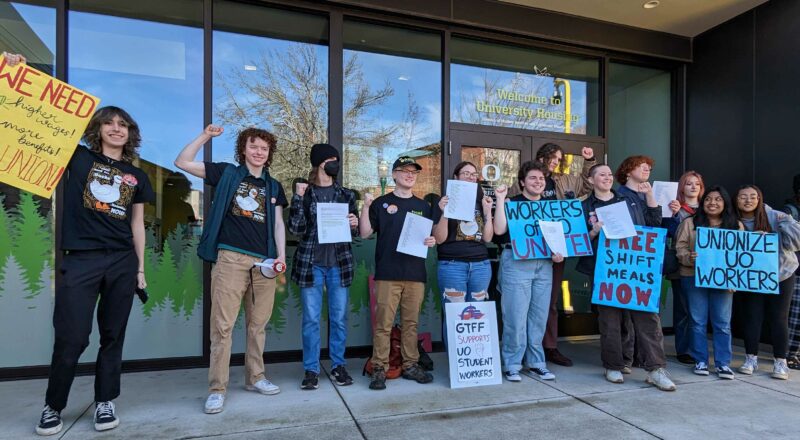On April 7, UO Student Workers (UOSW) filed a petition for a union with 2,175 signed cards, and their belief, based on public records they had viewed, that there would be around 3,000 members in their unit. Soon after, the University of Oregon responded that there was only 700 people that qualify based on what UOSW defined in the filing. UOSW was taken back by the list that they received that left off many types of workers that they were targeting to be a part of the union. What began next, and is still ongoing, is a multi-week battle against the University, with the help of their lawyers, and mediated by the Oregon Employment Relations Board, to clarify what the size of their bargaining unit should be.
In aim to get all regular student workers and avoid what is known as “stuffing the list”, where the employer would add temporary workers, unpaid interns, freelance workers, and the like, UOSW had to provide a specific definition, which was as follows:
UOSW_PetitionAll student employees of the University of Oregon who worked an average of 4 or more hours per week over the previous three months, excluding supervisory employees, confidential employees, and employees in positions that are or should be included in other bargaining units under existing certifications or recognition clauses.
When the UO supplied the legally required list of workers that believe fit that definition they left off all residence hall assistants (RAs) and workers from several other positions on campus. One of the union organizers who had consisistently been working 10 hours a week in the dining hall was left off the list.
“What we think happened is that they averaged new hires hours longer than they had been working. So throughout the entire six months span of our campaign, if you’ve only been working a month, it really, really dilutes your hours,” Carolyn Roderique, an RA and UOSW organizer says.
UOSW put up a post on Instagram and reached out to workers in other ways, asking them to email the UO administration about how unjust the actions are. They also asked workers to voluntarily report to them how many hours they have worked so they could have records of who was left off from the list they had received from the university.
The union has also filed a new Unfair Labor Practice (ULP) complaint with the ERB against UO. This is their second ULP, the first one was filed in the winter of this year over the firing of organizer Will Garrahan, who they claim was targeted because of his union activity. This new ULP wraps in the claim about the firing of Garrahan along with several other points.
In the ULP complaint, filed on May 18, UOSW details how another dining worker was told her job was on “thin ice” the same week that Garrahan was fired without any clear complaints about her job performance. They also outline how the administration and managers have repeatedly blocked union speech in spaces where similar non-work/academic speech was permitted. For example they say faculty were told by department administrators to disallow union discussions during class time on the basis that it was “political activity” when classes allow announcements for petitions.
Even before rulings on their ULP or certification of the union, they have seen wins by fighting back through direct action and legal filings directly citing labor law. Workers were previously barred from wearing union pins before Will Garrahan was fired, after they held a rally around his firing supervisors allowed them to wear them again.
“You could say it’s a little ridiculous.They should have been following labor law the entire time. But I think because people have been so generous donating to our solidarity fund and because we’re able to pay for things like lawyers, we’re able to guarantee that these protections are in place and that these protections are actually being enforced to protect workers,” Roderique says.
As UOSW battles on the legal end it continues to organize. The union has made the shift from card collection to having deeper conversations with one-on-ones. As they head into the summer they have the challenge of keeping members engaged and bringing in new leadership as many graduate. The union on its part intends to hold trainings and social events.
The fight for certification continues, even as people leave the workplace with the school year ending, as it is based off of that snapshot when they filed for card check.
UOSW_ULP